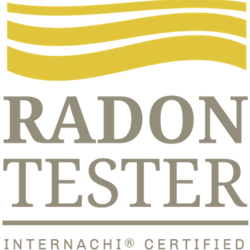Radon Monitoring
Click Below To Schedule Your Inspection
Don’t see a time that works? Call or text 503-893-8468
There may be an appointment available that isn’t showing up on our calendar.
Our Approach to Radon Monitoring
We start by looking at the radon map for the homes in your area, which gives us a good idea of what to expect. Then we bring and place our state-of-the-art radon monitor to the home, educate the homeowner on best practices during radon monitoring, and tag all of the doors and main operable windows. Our continuous radon monitor has 6 sensors that track humidity, temperature, and movement, ensuring that the reading you receive is accurate. The temperature and humidity readings ensure that closed home conditions are met, and the movement sensor ensures that the slightest movements are recorded so that the monitor is not tampered with. After the test, we collect the monitor and provide you with your report the same day!
Take a Look At Our Radon Monitoring Report HERE!
What Is Radon?
Radon is a naturally occurring radioactive gas that can cause lung cancer. You can’t see or smell radon. Radon is a colorless, chemically under-active inert gas. It easily penetrates common household and building materials such as paper, leather, low-density plastic (e.g., plastic bags), most paints, sheetrock, concrete, mortar, tar paper, wood paneling, and most insulation. It is fairly soluble in water and organic solvents. This radioactive gas is produced naturally by the breakdown of uranium. It is usually found in igneous rock, soil and well water. It can be harmful due to its radioactive nature. If it is inhaled into the lungs, it can damage cells. Because of this, radon is the second leading cause of lung cancer in the United States.
In a residential environment, radon testing with proper equipment is essential to ensure you are not being affected by this dangerous gas. Recommended by the EPA and the US Surgeon General, radon testing is an easy and inexpensive addition to your home inspection.
Radon Testing Methods
There are multiple time frames that can be used to test for radon: short-term, long-term, or continuous.
Short-term tests generally last between 2 – 90 days. This is typically provided for a real estate transaction. The benefit with a short-term test is that you are able to get results quickly, but the downside is that it is not the most accurate because radon levels vary throughout the year. A long-term radon test will provide you with more accurate results, but lasts more than 90 days.
An even more accurate radon testing method uses continuous radon monitoring (CRM) equipment.
While do-it-yourself testing kits are available, the EPA recommends hiring an AARST certified professional like Clear Vision Home Inspections to ensure that the testing methods utilized follow a specific protocol. Many states have guidelines that you should be sure are followed in order to protect yourself.
The state of Oregon requires that companies who offer radon monitoring employ individuals that are certified by either AARST or NRSB.
Check the Certification Status Here: AARST Ceritfication or NRSB Certification
Click Below To Schedule Your Inspection
Don’t see a time that works? Call or text 503-893-8468
There may be an appointment available that isn’t showing up on our calendar.
Additional Inspections
Home Inspection – Our Home Inspections are different! Our inspection begins before we ever set foot on your property. Read more here.
Thermal Imaging – Thermal Imaging is included with every home inspection here at Clear Vision Home Inspections. If you suspect a problem in your home or one that you are purchasing, it can be purchased as a stand-alone inspection. Read more about Thermal Imaging here.
Sewer Scope – Obtaining a sewer scope or sewer inspection can be one of the most cost effective ways to prevent unnecessary future expenses for a new home owner. Read more here. A Sewer Scope can be added to any home inspection for $100.
Home Energy Score – Are you selling your home in the city of Portland? You are required to get a Home Energy Score prior to listing! Read more about what a Home Energy Score is and how to get one here.


